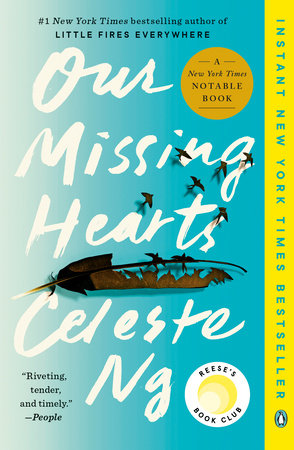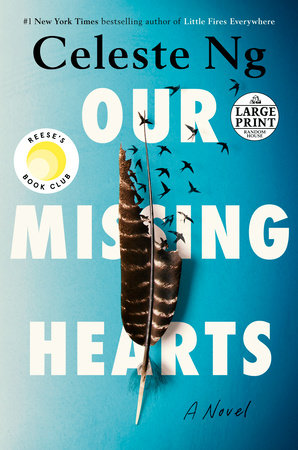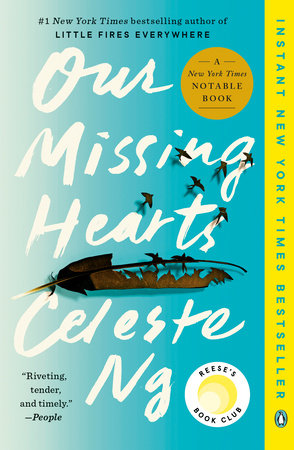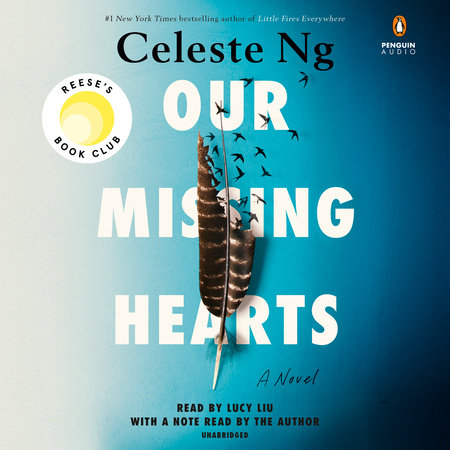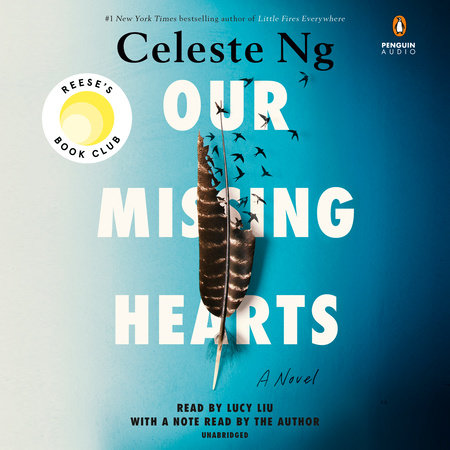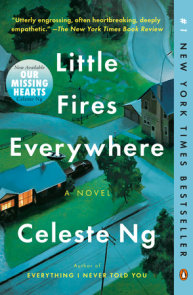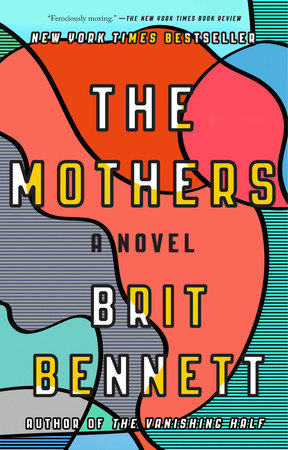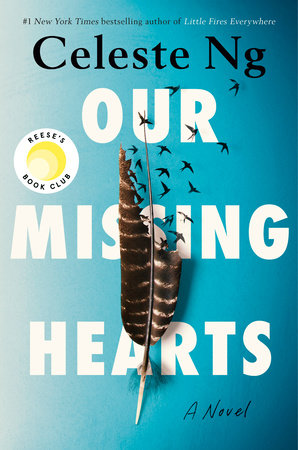

Our Missing Hearts
By Celeste Ng
By Celeste Ng
By Celeste Ng
By Celeste Ng
By Celeste Ng
By Celeste Ng
By Celeste Ng
By Celeste Ng
By Celeste Ng
Read by Lucy Liu and Celeste Ng
By Celeste Ng
Read by Lucy Liu and Celeste Ng
By Celeste Ng
Read by Lucy Liu and Celeste Ng
By Celeste Ng
Read by Lucy Liu and Celeste Ng
Category: Literary Fiction
Category: Literary Fiction
Category: Literary Fiction
Category: Literary Fiction
Category: Literary Fiction | Audiobooks
Category: Literary Fiction | Audiobooks

-
$18.00
Aug 22, 2023 | ISBN 9780593492666
-
$31.00
Oct 04, 2022 | ISBN 9780593632673
-
$29.00
Oct 04, 2022 | ISBN 9780593492543
-
Oct 04, 2022 | ISBN 9780593492550
-
Oct 04, 2022 | ISBN 9780593629628
592 Minutes
-
$40.00
Oct 04, 2022 | ISBN 9780593629611
600 Minutes
YOU MAY ALSO LIKE
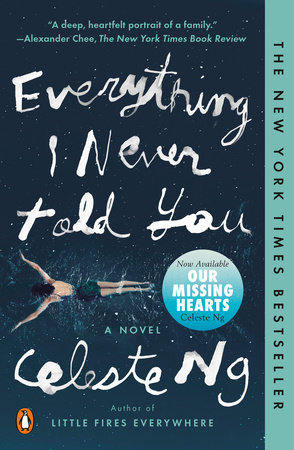
Everything I Never Told You
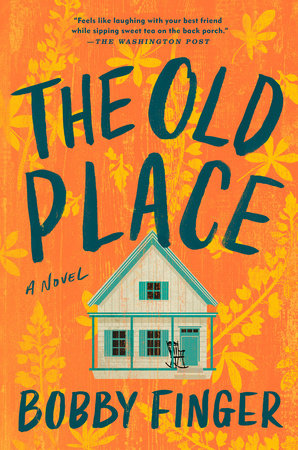
The Old Place
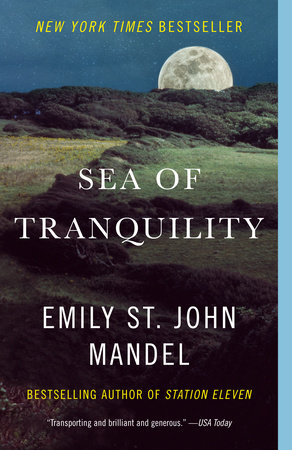
Sea of Tranquility
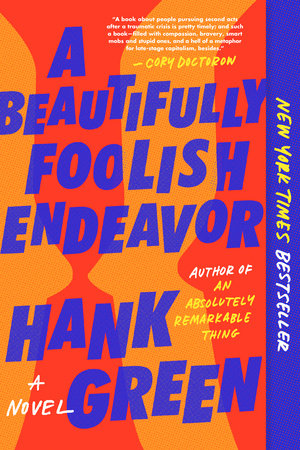
A Beautifully Foolish Endeavor
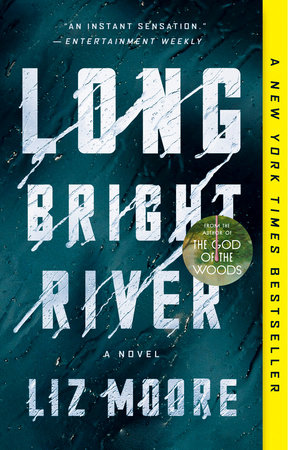
Long Bright River

The Last Letter from Your Lover (Movie Tie-In)
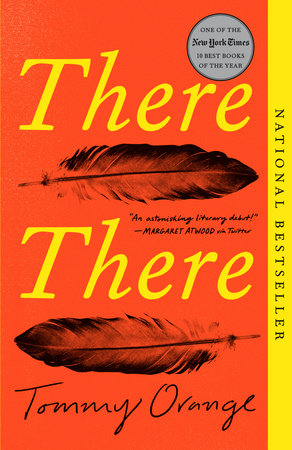
There There
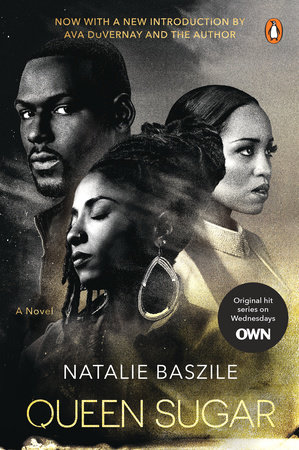
Queen Sugar (TV Tie-In)

Klara and the Sun
Praise
“Thought-provoking, heart-wrenching . . . It follows the story of a young boy named Bird on the search for his mother Margaret, a poet whose work was deemed unpatriotic. I was so invested in the future of this mother and son, and I can’t wait to hear what you think of this deeply suspenseful story!” —Reese Witherspoon (Reese’s Book Club October ’22 Pick)
“Firmly written and well-executed . . . a meditation on the sometimes accidental power of words . . . I won’t give away the splendid conclusion of Ng’s book; suffice it to say . . . It’s impossible not to be moved by Margaret Miu’s courage, or to applaud her craftiness . . . Ng succeeds . . . partly because her outrage is contained and focused, and mostly because she is often captivated by the very words she is using . . . Bird is a brave and believable character, who gives us a relatable portal into a world that seems more like our own every day.” —Stephen King, The New York Times Book Review
“In this riveting, tender and timely book, one mother speaks ‘into the darkness’ with love. Celeste Ng pleads: Listen.” —People, Book of the Week
“Our Missing Hearts reflects our headlines back to us, but it also powerfully and persuasively offers hope for changing those headlines. In a final moving turn, the novel dramatizes how bearing witness through art and simply speaking up can melt indifference. That sounds sentimental, I know, but Ng’s own masterful telling of this tale of governmental cruelty and the shadow armies of ordinary citizens who both facilitate and resist is its own best testimony to the unpredictable possibilities of storytelling.” —Maureen Corrigan, NPR’s Fresh Air
“Our Missing Hearts is at its core a parable about the wages of fear, how it can lead to bigotry, racism and institutionalized hatred . . . elevated, mythic . . . depicting the workings of control and domination throughout a culture and a nation . . . The notion of the accidental warrior is one of the many generous and compassionate aspects of Ng’s story—the idea that there is something brave in everyone—if only it can be reached.” —The Washington Post
“Shot through with vivid color and rising hope, an unflinching yet life-affirming drama about the power of art and love to push back in dangerous times . . . Ng’s brilliance lies in leaving the reader with an unshakable belief that against all odds, people will find the courage to resist, revolt, and defend . . . remarkable.” —Oprah Daily
“Propelled by hope, less a grim prognosis of the future than an impassioned call for a full reckoning with the past . . . resembles a box of myths transmuting into fresh, symbiotic insights when converged.” —NPR.org
“A book you won’t be able to put down, nor stop thinking about long after you do . . . Moves from a meditation on our current political and social state to a tight suspenseful thriller . . . Ng’s paragraphs are built with sentences so lovely and lyrical you likely will find yourself marking passages in every chapter to share with others.” —USA Today
“Devastating . . . Heartbreaking, beautifully written and unforgettable—and ultimately a celebration of the power of poetry and storytelling.” —The Seattle Times
“Heart-wrenching and brilliant . . . This is the book I will pass down to my children when they ask me what it was like to live through this time in history: the pandemic, anti-Asian attacks, and the racial justice protests that have come to define our moment. It captures the difficulty of bearing witness at personal cost to oneself and caring about things even when they seem beyond fixing.” —The Boston Globe
“Stunning . . . At the core of Ng’s narrative—a 12-year-old boy’s epic quest to find his missing mother—is the all-important question of how we communicate . . . Poignant.” —Los Angeles Times
“Suspenseful . . . Ng unflinchingly depicts acts of racism, family fragmentation and the violence seamed into American identity. Ng’s book is also an homage to librarians who are the vanguard of resistance to PACT . . . Ng excels at narrative tension and at mustering readers’ fear and outrage . . . a powerful reflection and grim augury . . . Like George Orwell, Margaret Atwood, Kazuo Ishiguro and Octavia E. Butler, Ng pays close enough attention to write tomorrow’s headlines.” —The San Francisco Chronicle
“The stunning story Ng beautifully weaves is the perfect book for our present moment—a cautionary tale of what happens when fear goes unchecked and of the power of art and brave individuals to bring social change. Ng writes in her author’s note that ‘it is hard to analyze your own era,’ but with Our Missing Hearts, she has nailed it.” —ELLE.com
“This is a haunting, lyrical look at the power of love, art and banding together to work toward change. It’s a heartwarming, fast-paced read that will challenge you to think more deeply about our responsibilities to one another and society’s most vulnerable.” —Good Housekeeping
“Ng has crafted an unwaveringly dark fairy tale for a world that has stopped making sense.” —Vogue
“Ng effortlessly combines a character-led family story with a detective tale, a tribute to books and storytelling and a confrontation with history . . . quick and poised . . . exceptionally powerful and scaldingly relevant.” —The Guardian (UK)
“The tension is inescapable. Bird’s journey, as he searches for Margaret, has a mythical quality . . . Language and story, her new work suggests, cannot be taken for granted; stories must always be heard, always be told.” —Minneapolis Star Tribune
“So compelling the reader will immediately want to know how it ends . . . uncomfortable and necessary.” —Pittsburgh Post-Gazette
“The quest to find and flex the power of language is the central conceit of this book. And when we finally meet Bird’s poet mother, Ng’s prose quickens, becoming more complex, the ideas more nuanced, the relationships spikier . . . In chronicling the specificity of parental love, Our Missing Hearts pierces and reanimates our weary ones.” —WBUR.org
“A jolt to the system and a booster of hope.” —Oprah Daily, Fall Fiction Preview
“[Ng’s] most powerful work to date.” —People
“Bold, powerful, and timely.” —AV Club
“A compelling and brutal telling of a too-real dystopia . . . It’s a thought-provoking book that will stay with you long after the last page.”—Country Living
“Deeply poetic, beautifully and succinctly written, and thoroughly immersive . . . a world we can exist within only briefly, but it makes a permanent heart-shaped imprint.” —Shondaland
“Powerful and profound.” —KMUW
“[Ng’s] talent is as apparent as ever. The novel shines . . . poignant and timely . . . a gut-punch.” —PureWow
“Ng is very good at writing social commentary that’s too full of heart and humanity to feel preachy . . . almost folkloric . . . But as Ng shifts perspectives and fills in the details of how America became the version of itself her book describes, things get scarily real.” —Vulture, Books We Can’t Wait to Read This Fall
“A timely and riveting dystopian novel which mirrors past and present societal attitudes.” —Chinese American Librarians Association
“What an immense joy it is to be back in the trusty hands of Celeste Ng! Like Little Fires Everywhere and Everything I Never Told You, Our Missing Hearts is a careful study of a family trying their best to live their lives in a world that is rooting against them . . . [W]hat’s particularly striking is Celeste Ng’s ability to show us the horrors of this world while also showing how banal it’s become for our characters . . . This is a tale that is propulsive and poignant in equal measure; it’s a much-needed love letter to the written word.” —Literary Hub, 22 Novels You Need to Read This Fall
“Showcases Ng’s own ingenuity and range. Brilliantly envisioned and filled with Ng’s signature tender, intimate character work and complex family dynamics, this coming-of-age story asks what it means to be a good parent or a good citizen when every child is at risk, as well as what power art has to challenge injustice.” —Shelf Awareness
“Stunning . . . A gorgeous and provocative novel that asks readers to look critically at American society and reject all modes of tyranny in favor of company, acceptance and love.” —Bookreporter
“Known for focusing on families, race, and relationships, Ng raises the bar another notch in a story intensified by reference to such police violence, political protest, book banning, and discrimination against people of color. Ng’s beautiful yet chilling tale will resonate with readers who enjoyed Margaret Atwood’s The Handmaid’s Tale and Jessamine Chan’s more recent School for Good Mothers. As with her previous novels, her storytelling will not disappoint.” —Library Journal (starred review)
“Sensitive, nuanced, and vividly drawn . . . Thoroughly engrossing and deeply moving . . . Taut and terrifying, Ng’s cautionary tale transports us into an American tomorrow that is all too easy to imagine.” —Kirkus (starred review)
“Remarkable . . . Ng crafts an affecting family drama out of the chilling and charged atmosphere, and shines especially when offering testimony to the power of art and storytelling . . . Ng’s latest crackles and sizzles all the way to the end.” —Publishers Weekly (starred review)
“Utterly stupendous. Ng creates an exquisite story of unbreakable family bonds, lifesaving storytelling (and seemingly omniscient librarians!), brilliantly subversive art, and accidentally transformative activism. As lyrical as it is chilling, as astonishing as it is empathic, Our Missing Hearts arguably achieves literary perfection.” —Booklist (starred review)
“Celeste Ng is undoubtedly at the top of her game . . . Ng’s prose highlights the fateful and sometimes absurd connections between our world and the realm of ideas, reminding readers that what is in our heads will always reveal itself in our bodies. The result is a novel that will undoubtedly impact how we connect and live in this terrifying, beautiful world.” —BookPage (starred review)
21 Books You’ve Been Meaning to Read
Just for joining you’ll get personalized recommendations on your dashboard daily and features only for members.
Find Out More Join Now Sign In








